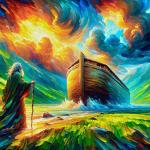As college classes, including my own, conclude for the Summer, I will reveal an academic secret: professors often learn from their students. Being an audience of one for all of those papers has its rewards. In my Shakespeare class, several students wrote about some aspect of the emerging view of nationhood in Shakespeare’s history plays. The nation-state, after all, was a fairly recent development in the 1590’s when Shakespeare wrote his histories, with England transitioning from the feudal system, with its personal loyalties to local lords, to a highly-organized central government commanding citizens with a strong sense of their “Englishness.”
But, as Shakespeare’s plays suggest, there are different understandings of what constitutes a nation: (1) a geographical locality; that is, a land, a place (“this sceptered isle”); (2) a people (“we band of brothers”); (3) a government; that is, a sovereignty embodied in the monarch (“Henry V”); (4) a distinctive spirit or ideology (not so evident in Shakespeare, except for perhaps hints of English liberties and differences with France).
It occurred to me that these same different views of nationhood are still with us today and that we Americans have not really arrived at a consensus about it, resulting in some of our confusions.
Is (or are) the United States of America a geographical locality? (A citizen is defined as someone born within U.S. borders. We speak about our “country,” our homeLAND.”)
Or does America consist of a people? (We do have a distinct culture as Americans. Then again, part of that is a strong strain of individualism, which undercuts any sense of collective unity. So does America’s cultural diversity.)
Or is the nation defined as our government? (We do not have a king, but we have a Constitution, which might be said to embody or, perhaps better, inscript our nation. We also have Presidents that, for some people, embody the nation, whether Barack Obama or Ronald Reagan. The notion that the nation is the government is expressed in that Democratic convention video that said “Government is the only thing we all belong to.” Such a view is taken for granted in totalitarian countries, but identifying the nation with the government takes place here too, perhaps especially on the Left, though the Right has also thought this way.)
Or is America about a set of beliefs? (The United States, perhaps more than any other nation, defines itself around principles such as freedom, Democracy, equality, and the like. Would-be new citizens must pass an exam on the ideas and ideology of the Declaration of Independence and the Constitution. Then again, that freedom means that beliefs in opposition to those principles must also be tolerated.)
So what are we, anyway?
How are these different views of nationhood evident in the current debates over immigration?
What is the best way of thinking about our nation? What are the problems we would have to navigate under the different models?
HT: Jordan Sillars, Kyle West, Cody Holt















